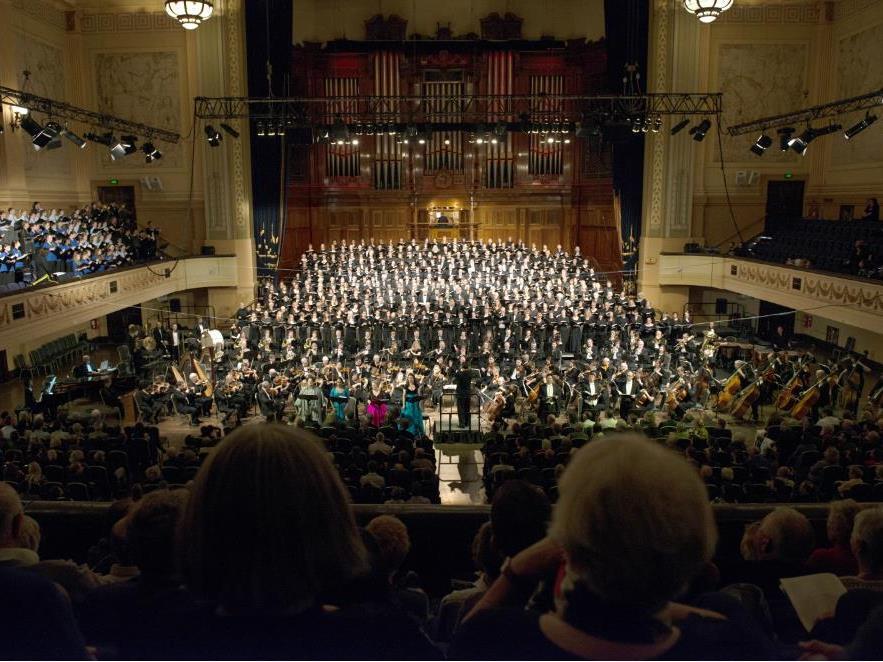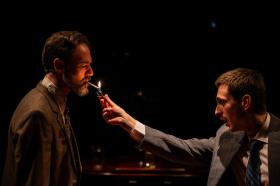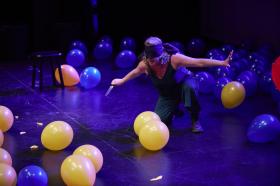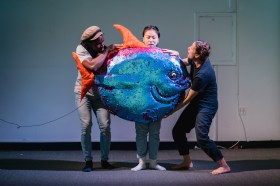Mahler’s Eighth Symphony, also known as ‘The Symphony of a Thousand’ is an ambitious undertaking at the best of times. For a community orchestra and an assortment of community choirs to bring it off successfully, it takes a special brand of optimism plus the ability to persuade professional musicians that this was a significant occasion worthy of support. As concertmaster of the Melbourne Symphony Orchestra it was highly appropriate that Wilma Smith should lead the Zelman Symphony since Alberto Zelman actually founded the MSO in 1906.
Celebrating the 80th birthday of the Zelman Symphony with the Mahler 8 was the brainchild of the orchestra’s conductor, Mark Shiell, who was guided by Messiaen’s advice: ‘consider the charm of impossibilities’. Shiell also found inspiration in the passionate support for community music-making by his former teacher, John Hopkins, to whom he dedicated his part in the evening’s performance. Eighteen months of hard slog by a dedicated committee, headed by George Deutsch, followed. On Saturday night their perseverance and enthusiasm resulted in a powerful performance of considerable merit.
Although not quite ‘a Thousand’, the 600 plus performers, comprising the Zelman Symphony bolstered by various notable professional players, ten community choirs and eight fine professional singers, were an impressive sight. Even with the children’s choirs and a complement of brass in the balcony the stage could not accommodate the orchestra and soloists, who took up the front of the auditorium. Although this placed some strain on the acoustics and made the conductor’s task even more formidable, there was certainly an uncommonly close degree of contact between the performers and the almost capacity audience.
From the massive outburst of the opening Veni, Creator Spiritus it was clear that passion would be the driving force in this performance. Considering that love is the central motif of both parts of this monumental work, it could not have been more appropriate. Celebrating God’s love in ‘Part 1: Hymnus’ and the redemptive power of love, especially as expressed in the feminine, in ‘Part 2: Final Scene of Goethe’s Faust’, Mahler dedicated this astonishing amalgam of symphony, oratorio, cantata and opera to his wife.
The choral invocation to the Creator Spirit was as rousing as one could wish. There was such a wash of sound coming from the choir and brass that it was difficult to follow the texts much of the time, but the central thrust was clear. Henry Choo’s attractive tenor voice managed to rise above the orchestra in his solo passages and his ardent delivery served the text well. The softer choral passages and Wilma Smith’s violin solo were beautifully rendered. The song of praise, which concludes this movement, was suitably triumphant but accentuated the fact that Mahler makes heavy demands on his vocal forces in this symphony. In terms of range and sustained power choirs and soloists were pushed to, and sometimes beyond, their limits.
After the thrilling climax of Part 1 and a reflective silent pause, Part 2 began with an extended orchestral ‘Adagio’. Completely contrasting in mood, the themes of some of Goethe’s characters are introduced in music that is typically Mahler in full Romantic mode. Plucked lower strings against flute and clarinet, brooding horns followed full strings, revealing the orchestra to be capable of accomplished playing that moved and delighted even though it was not always precise. The Chorus and Echo of the Holy Anchorites were particularly effective at the end of this movement.
All of the soloists assumed characters from Goethe’s play in the following sections of Part 2. Andrew Jones was an impassioned if hard pressed Father Ecstaticus and Adrian Tamburini employed his wide range and sonorous bass to dramatic effect as Pater Profundis. Henry Choo was a passionate Doctor Marianus as he made his appeal to the Mater Gloriosa. Although her voice was stretched beyond its limits at a couple of points in this demanding work, Antoinette Halloran’s glowing presence contributed greatly to a sense of involvement with the drama of admitting Faust’s soul to heaven. Rosamund Illing, always spot on musically and vocally, made an appealing penitent woman and gave a strong core to the many ensemble passages. Karen van Spall was a warm Mulier Samaritana and Liane Keegan really shone in her small solo as Maria Aegyptiaca, her strong dramatic soprano having a quality that reminded me of Christa Ludwig. Nicole Car sang her brief passage as Mater Gloriosa from the organ loft, her lovely soprano and physical presence in keeping with the homage to feminine beauty of the final ‘Chorus Mysticus’.
The symphony ended as it began: with full majestic force. Enormously exciting as this was, for me, some of the most satisfying moments came in the quieter sections. One of the choral highlights came in the form of the warm, youthful female voices of the Younger Angels. A beautiful transparency in the quality of the sound was perfectly in keeping with their role.
Whatever aspect of the concert the audience found most rewarding, the general response was enthusiastic. Mark Shiell and his forces had achieved what they had envisaged: a special celebration of community music-making with a magnificent rarely performed work that encapsulates the hopes and aspirations of humanity. Even if the level of achievement was uneven, full marks must be given for a successfully realised endeavour.
Rating: 3 ½ stars out of 5Zelman Symphony 80th Anniversary Concert
Zelman Memorial Symphony Orchestra
Mark Shiell: conductor
Wilma Smith: guest concertmaster
David Macfarlane: organ
Antoinette Halloran: Soprano 1, Magna Peccatrix
Rosamund Illing: Soprano 2, Una poenitentium
Nicole Car: Soprano 3, Mater Gloriosa
Karen van Spall: Alto 1, Mulier Samaritana
Liane Keegan: Alto 2, Maria Aegyptiaca
Henry Choo: Tenor, Doctor Marianus
Andrew Jones: Baritone, Pater Ecstaticus
Adrian Tamburini: Bass, Pater Profundus
Massed choirs of:
Essendon Choral Society
Heidelberg Choral Society
Latrobe University Choral Society
Monash University Choral Society
Monash University Singers
Southern Voices
Star Chorale
Victoria Chorale
Children’s Choir
St Catherine’s School Toorak
Southern Voices Concert Choir
Program: Mahler Symphony No 8
Melbourne Town Hall
21 September
Photo: Jesse Marlow





